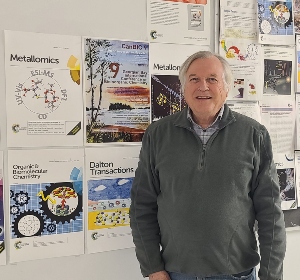Professor Martin Stillman Wins Linstead Award
 Professor Martin Stillman was awarded the Linstead Prize of the Society for Porphyrins and Phthalocyanines for his cumulative research into the tetrapyrroles that are the structural foundation for porphyrins in heme proteins, the chlorins in chlorophyll, and the corrins in cobalamins (vitamin B12). The specific focus of the prize is his work understanding the electronic structural control of the spectroscopic and electrochemical properties of the technologically important phthalocyanine dyes. Starting in 1970s he rpeortedanalysis of the absorption and magnetic circular dichroism spectra of a wide range of phthalocyanines. The MCD data provides the angular momentum of the excited states, those states control the coulrs and the photochemical properties. This work started with Kathy Martin, and continued with a stream of talented research students, including Tebello Nyoking in the 1980s, who was conferred with an Honorary Degree at UWO in 2019. The latest students were Alice Jin, Angel Zhang, Debbie Chan, Riley Hooper and Lydia Kwan who all worked on chlorophyll models and the control of the electronic structures first studied in detailed by Martin Gouterman in the 1960s. As part of this honour, he will deliver an award address at the next international conference to be held in June.
Professor Martin Stillman was awarded the Linstead Prize of the Society for Porphyrins and Phthalocyanines for his cumulative research into the tetrapyrroles that are the structural foundation for porphyrins in heme proteins, the chlorins in chlorophyll, and the corrins in cobalamins (vitamin B12). The specific focus of the prize is his work understanding the electronic structural control of the spectroscopic and electrochemical properties of the technologically important phthalocyanine dyes. Starting in 1970s he rpeortedanalysis of the absorption and magnetic circular dichroism spectra of a wide range of phthalocyanines. The MCD data provides the angular momentum of the excited states, those states control the coulrs and the photochemical properties. This work started with Kathy Martin, and continued with a stream of talented research students, including Tebello Nyoking in the 1980s, who was conferred with an Honorary Degree at UWO in 2019. The latest students were Alice Jin, Angel Zhang, Debbie Chan, Riley Hooper and Lydia Kwan who all worked on chlorophyll models and the control of the electronic structures first studied in detailed by Martin Gouterman in the 1960s. As part of this honour, he will deliver an award address at the next international conference to be held in June.
The award is named after the father of Phthalocyanine Chemistry: Sir Patrick Linstead, whom was educated in London, UK (interestingly at the same high school Martin attended but 60 years earlier) and then he worked as an organic chemist at Imperial College, London. Sir Patrick characterized the 1st well known phthalocyanine, the copper metallated species that had been found as an impurity in the blue dying vats of Scottish Dyes in the 1928. That first compound was characterized in 1934 by Linstead as the iron derivative, FePc, and that was the compound that anchored Martin’s PhD work with Andrew Thomson at UEA. in 1973.
Professor Stillman will also be chairing the 9th CanBIC conference, which is supported by the Department of Chemistry. Look out for it in May 2025!

